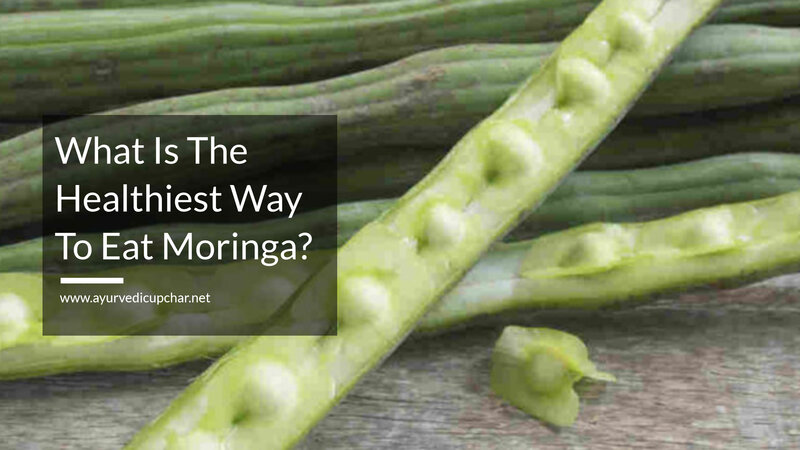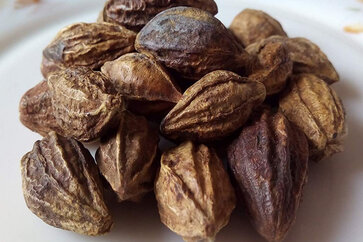What Is The Healthiest Way To Eat Moringa?
 The moringa also called the tree of life is a medicinal plant that has a high content of vitamins and minerals such as iron, carotenoids, quercetin, vitamin C, polyphenols, and chlorogenic acid, besides this, it also provides a powerful antioxidant and anti-inflammatory effect.
The moringa also called the tree of life is a medicinal plant that has a high content of vitamins and minerals such as iron, carotenoids, quercetin, vitamin C, polyphenols, and chlorogenic acid, besides this, it also provides a powerful antioxidant and anti-inflammatory effect.
It is used to treat some respiratory diseases, reduce anxiety, and weight loss, and even control blood glucose in diabetics. Its scientific name is Moringa oleifera, the most part of this plant used are the leaves that is where the highest concentration of antioxidants.
It can be consumed either in the form of tea, capsule, or powder or can be purchased from natural products stores, herbalists, online stores, or handling pharmacies.
In Ayurveda Moringa is used as Ayurvedic medicine, to balance the Vata and Kapha dosha.
What is moringa good for?
This plant contains many benefits, some of which are still under study, and however, the main ones are:
- Increases respiratory capacity, helping to fight diseases such as asthma.
- Prevents diabetes because it has properties that help regulate oxidative stress, and it can help to reduce blood sugar levels, improving protection against cell damage.
- Protects the heart, preventing the absorption of cholesterol in the intestine and the formation of fatty plaques in the arteries, thus decreasing the risk of cardiovascular disease.
- It regulates blood pressure because it improves blood circulation due to its vasodilator effect.
- It helps in weight loss it contains fibers and a high amount of proteins that help to increase the feeling of fullness.
- Prevents and combats anemia, because its leaves have a high amount of iron (105 mg per 100 g), favoring the increase of red blood cells.
- Increase the body’s defenses because it has antioxidant substances such as polyphenols, vitamin C, and beta-carotene that stimulate the immune system.
- It has an anti-inflammatory and analgesic effect because it contains isothiocyanates, quercetin, and chlorogenic acid, which are substances that help to reduce the inflammatory process, relieving the symptoms of diseases such as rheumatism, and inflammation of the prostate for example.
- Protects and moisturizes the skin, because it contains vitamins B1, B2, B3, B6, C, E, and A, favoring the healing of the skin.
- Improves the health of the digestive system, preventing or treating stomach ulcers and helping to combat constipation due to its high fiber content.
- Helps to treat hemorrhoids, because it improves blood circulation causing a vasodilator effect.
- It improves vision thanks to its high content of beta-carotene, which is a precursor component of vitamin A.
- It helps reduce the effects of menopause, because it helps to maintain levels of inflammation and oxidative stress during this controlled stage, favoring a natural balance of the hormones that are affected during this phase.
Properties of moringa
The properties of moringa include antioxidant, antidiabetic anti-inflammatory, analgesic, vasodilator, anticholinergic and antirheumatic action.
How to drink?
Although there is still no proven scientific dose, some studies suggest that the intake of 150 to 200 mg/kg per day can provide all the benefits mentioned above.
The dose will depend on the way in which the plant is ingested, which can be:
- Moringa tea: Place 250 ml of water in a pot over medium heat until it boils, add 1 tablespoon (10 g) of moringa leaves, cover, and let stand for 5 minutes, strain, and drink 2 cups a day.
- Capsules: 1 to 3 capsules a day in conjunction with meals, this varies according to the brand, so you should read the labeling of the product.
- Seeds: In case of consuming their seeds, they must be shelled and ingested with a glass of water, being able to consume 3 grams a day (approximately 2 to 3 seeds per day).
- Powder: From 1/2 to 1 teaspoon a day (1 to 3 grams), being able to be added to juices, soups, coffee, or yogurt, or even prepare tea with the powder.
How long should it be taken?
Moringa is a plant that is currently in studies, so there is no certain time for which you can ingest this plant; the important thing is to take the recommended dose without abuse.
Side effects
The side effects of moringa are nausea, vomiting, and diarrhea. It is important to avoid the ingestion of the root and its extracts since they contain toxic substances that can cause paralysis and even death.
Contraindications
Its intake is contraindicated in pregnant women because the effects are still unknown during this phase in humans, in some studies, animals have apparently induced abortions.
It is possible that moringa increases the production of breast milk, however, it is not fully proven, so it is better to consult the doctor before consuming it during breastfeeding.






















